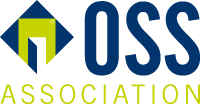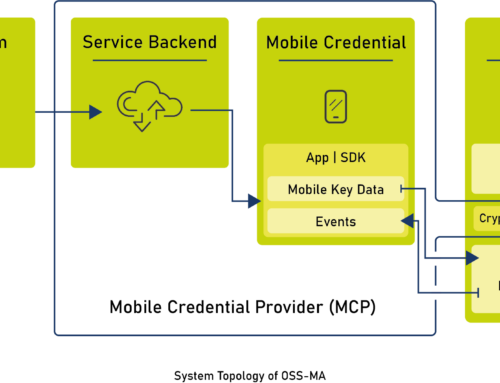Standards by OSS in discussion with manufacturers and users
As part of the first media talk, we asked Frederik Hamburg, Chairman of the OSS Association and Managing Director of ZUGANG GmbH, about his motivation and his experiences with the introduction of standards in the security industry. We also spoke to Matthias Schmid, Business Development Manager at ASSA ABLOY, about the advantages of using standards from a manufacturer’s point of view. Harmut Beckmann, Sales Manager at Uhlmann & Zacher, gave another view from the manufacturer’s perspective, and finally, Patrick Senneka, Senior Product Developer in the IT department of Fraport AG, showed us interesting references about the use of standard access control from the user’s point of view.
Frederik Hamburg, what motivates you to work as chairman of the OSS Association for standards in the security industry?
My motivation was initiated by the users who use many different locks. Their concern was and is to liberate themselves from the proprietary systems of the manufacturers. In the meantime, the requirements for complex security systems have increased. The market is often confusing, which is why customers want the different systems to be able to communicate with each other, regardless of the manufacturer.
When was the OSS Association founded?
The OSS Association was founded in 2015. From the very beginning, the idea was to develop standards “from industry for industry” and whenever new requirements emerged, we always wanted to develop these standards further. The members of the OSS Association cover the entire field of the security industry. Together they can contribute to the further development of the standards.
The aim is to connect the individual components so that, for example, the key card communicates with the database software in order to be able to read authorizations for door locks and access control and time recording systems.
This communication is based on standards by OSS to ensure compatibility with and independence from manufacturers of different brands.
Do the users’ requirements influence further development?
In any case, the users are our first source when it comes to identifying essential further developments. The manufacturers and their customers enter into dialogue. Before the pandemic, we held user meetings in face to face contact to find out what customers wanted. We are planning the next user meeting in 2023.
Such user meetings serve to “listen to the customer” and to understand which components should be further developed and which should be added.
We are also noticing an increasing need for the use of standards – even some manufacturers do not yet want to see the advantages of these standards. The use of standards also means opening up to other systems and taking the risk – admittedly small – that customers (may) opt for other products because proprietary is being relinquished.
In fact, the opposite is the case. With the use of standards by OSS, manufacturers become competitive and are always up to date in this respect due to the constant further development of the standards. Individual components from different manufacturers can now communicate with each other. The end customer appreciates this flexibility, which can also lead to a reduction in costs, since the choice is greater and the dependency on one manufacturer is eliminated.
ASSA ABLOY
As a manufacturer of security technology, ASSA ABLOY is a big player on the international market. The company is one of the leaders in the security industry with subsidiaries in over 70 countries with more than 50,000 employees and annual sales of over 9 billion euros. In the DACH region alone, turnover of the ASSA ABLOY unit “Opening Solutions” was 275 million euros in 2021, primarily in the area of electronic access control, protective devices and locking systems.
Mathias Schmid has been Business Development Manager Access Control at ASSA ABLOY Sicherheitstechnik GmbH since 2019 and is responsible for the further development of the solution portfolio in the field of electronic access control systems.
We asked him about the development of standards from a manufacturer’s point of view.
What was ASSA ABLOY’s motivation as a manufacturer, to use advance standards?
ASSA ABLOY has been using Standard Offline since 2015 and is one of the founding members of the OSS Association e.V.
Our customers, both end customers and system integrators, expect or require from us as system and component provider, that the electronic fittings and cylinders can also interact with products from other providers. That was the starting shot for us to expand the development of standards together with the OSS Association.
The Aperio product portfolio, which has included both online integration via radio and offline integration via “Data on Card” for more than 15 years, supports OSS Standard Offline ex works. This enables our customers and partners to easily integrate the Aperio components into their system and, if necessary, to have them communicate with other components. Customers therefore choose a product that meets their requirements.
At first glance, this does not seem favorable for the manufacturers, because the days of proprietary systems are now a thing of the past and supplier loyalty has been eliminated to some extent. the manufacturer’s point of view, what are the advantages of using standards?
At first glance, the supplier independence appears to be disadvantageous for the manufacturers, but the opposite is the case. With the growing market requirements, everything the customer requires, can be delivered. The integration of different components and products from different manufacturers often offers better solutions than a single provider with a limited portfolio. That is why the standards also open greater scope for us as a manufacturer in the integration of other systems and we can create the optimum system for the customer.
We see again and again how important it is that the manufacturers work on a joint development when there are new requirements, as practiced by the OSS Association.
And that’s not all: in tenders, system integrators can offer preferential components from different manufacturers, because these have become compatible with others thanks to the manufacturer-independent standards. The advantage for the tenderer is the “perfect solution” that meets his requirements and which he can easily expand later with standard-compliant components. This promotes the acceptance of the access control and locking systems and so promotes market growth for the entire industry.
Where is the journey going in the next few years?
Mobile access i.e., access control via mobile devices, will certainly be an important topic in the coming years. This is demanded by the industry, but acceptance and distribution in Germany is not yet available across the board. Here, too, we need to investigate whether a standard can be the driver for mobile access.
Fraport
From the customer’s point of view, the use of standards offers many advantages. We asked Patrick Senneka, who has been with Fraport AG since 2012 and is responsible for the use and further development of the ESA (electronic locking system) product, about his experiences.
What motivates you to use standards?
The OSS-SO standardization makes it possible to integrate software and hardware components from different providers into an overall solution. This way, we guarantee investment protection and at the same time dispense with proprietary systems.
In total, we use around 75,000 airport ID cards and around 7,500 offline readers at Frankfurt Airport.
With the use of standard offline, we can implement large installations and, for example, fall back on alternative OSS components in the event of delivery problems or special requirements. This is a big advantage for us. The use of standards enables a high degree of interoperability of the products and flexibility in implementation.
An airport has special security requirements. How is this secured through the use of standards?
Imagine if every employee at Fraport had their own key for the different access authorizations. The employee leaves, loses the key, changes position and thus access authorization. What a hassle to do this with mechanical keys and still ensure security!
The electronic locking systems and thus also the Standard Offline protocol makes it possible to issue keys/authorizations that are limited in time and can be changed in the central system with a single click. This ensures both security and an optimized use of resources.
According to the forecast, mobile access will play an increasingly important role in access control over the next few years. What about mobile access at the airport?
This is an interesting topic for us, at the moment, but less relevant. T he laws applicable to the security areas require the permanent wearing of a visual feature, which cannot currently be realized with mobile devices.
What is your wish for 2023?
A user meeting to discuss new developments and exchange ideas with other users would be important for the further development of the standards by OSS.
Uhlmann & Zacher
Another manufacturer, or OEM (Original Equipment Manufacturer), is the family-run company Uhlmann & Zacher. To date, the company has produced more than 1,000,000 electronic locking units. We asked Hartmut Beckmann, authorized signatory and sales manager at Uhlmann & Zacher, about his experiences with the use of standards in Germany and worldwide.
Mr. Beckmann, how do you assess the situation in Germany regarding the use of standards?
In Germany there are still a few manufacturers who prefer to use their own proprietary systems. They see a loss of market power in the use of standards.
However, there are manufacturers and users who have discovered the advantages of the standards for themselves. If many locking systems must have very high security standards for a large number of people, the standards open up new possibilities.
It would also be desirable if the standards by OSS could be used across countries, i.e. in an international context. Here, for example, we have some partners in France who use OSS-SO.
In your opinion, what is the advantage of Standards by OSS?
Uhlmann & Zacher does not sell to end customers, that is the strategy of our company. OSS-SO gives us the opportunity to win new integration partners without these partners having to develop a proprietary solution.
How do you see the future of Mobile Standard?
As an example, mobile end devices are equipped with Bluetooth. Here, a standard ensures that different end devices can communicate. Zhere are many players in the mobile sector, some new start-ups, some growing, some established. In this area, the standard ensures that the technology remains sustainable, even if a company disappears from the market again.
And the overall view of Germany? What about mobile use, i.e. mobile access in Germany?
In Germany, the acceptance of the management of mobile access control – in contrast to other countries – is still somewhat hesitant.
However, we are currently working on a project to establish our own mobile access platform. We look forward to the next steps and further development.
Your view of the future, what would you wish for?
We would be pleased if large companies – independent of competitive thinking – would cooperate and participate in the further development of the standards.
From our point of view, sales would be significantly simplified if as many larger projects (and companies) as possible would rely on the standard by OSS.




